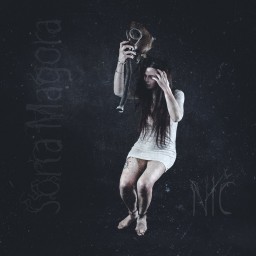 Review by Sonny for Sorta Magora - Nič (2019)
Review by Sonny for Sorta Magora - Nič (2019)
Sorta Magora is yet another project from our prolific old friend, Belgian multi-instrumentalist Déhà who, aside from the many releases he has put out under his own name, also issues material as Imber Luminis, Slow, Aurora Borealis, Yhdarl and Clouds to name but a few of the many aliases, side projects and bands he is involved with. Sorta Magora sees him team up with Slovakian vocalist Veronika Madžová, aka Dryáda, who contributed vocals to Imber Luminis' 2019 Same Old Silences album. To date, Nič, also released in 2019, is the only material released under the project's own banner.
The album takes the form of a single, forty-minute track that melds together those most comfortable of bedfellows, funeral doom and atmospheric black metal. I think these two styles of extreme metal are perfect complements to each other at the best of times, and here Déhà expertly weaves them together into a cohesive and encompassing piece that is overflowing with atmosphere and mood. Now, I have never been the biggest fan of ambient music, for some reason it usually, bar a few rare instances, fails to connect with me. Yet, whilst listening to Nič, I suddenly made that connection, despite the fact that this isn't an ambient release. The genius of it is that it uses the dual-barrelled extreme metal approach to achieve a very similar effect to the best that ambient music can offer. Within this single piece of music you can be bouyed-up by a heaving swell of sound, only to later be dragged down by the irresistible tug of murky undercurrents and smothered by a cloying tsunami of crushing, doom-laden chords. Of course, these changes don't occur quickly or jarringly, but are generally glacial in their transition from one to the other, as if luxuriating and revelling in their sheer physical presence and shedding or gaining energy in a deliberate and organic manner.
The swelling tsunami of instrumentation is complimented and contrasted effectively by Dryáda's furious howls of anguish that pour forth in an almost cathartic litany of distress. Déhà himself also contributes vocals, his being a deeper, more nether-demon sounding performance. The lyrics, written by Dryáda in her native Slovak, are dour and grim, heralding the final days of a dying world and the protagonist's longing for that ultimate darkness. This is a release whose music is shorn of hope and is relentlessly bleak, the music intended to be as overwhelming and irresistibly bleak as the final unavoidable fate of a world devoid even of light, let alone life and is a prime example of blackened funeral doom that deserves much more attention than it has so far received.
